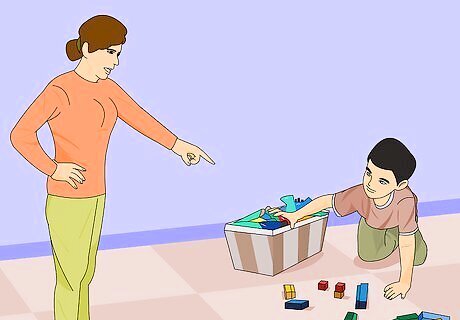
views
Responding in the Moment

Remind them of their limits. Tell your child that disrespect out out-of-bounds, especially with you. Tell them what kind words they can use and what words are not okay. Treating you with disrespect is not okay. Say, “It’s not okay to talk to me that way, it’s disrespectful. Would you like to try again?” You can also say, “It’s not okay to make demands of me. You can ask me a question, though.”

Reconnect. Often, young children use defiance or bossiness as a way to reconnect. Offer your toddler a hug or reconnect to your preschooler through play. Empathize with their feelings and find a way to meaningfully connect. For example, start a tickle war or get on your child’s level and give them a hug. You can also look for some small ways that your child can be in charge. For example, you could put your child in charge of a task, such as letting them choose what to have for dinner from a list of options or asking them to remind you when it is time to leave for their dance class.

Show your understanding. Express to your child that you hear their demand. You can affirm their words or their feelings. This helps to show your child that you are listening and aware of what they want. It’s important for children to feel heard, even when they do not get their way. However, you have the final say in what happens. For example, say, “I hear you saying you want to stay home, but it’s time to go to the dentist now.” You can also say, “I see that you’re upset that you’re not getting dessert. But you’ve said you don’t want to eat your food.” If your child is making a demand, say, “I hear that you want that toy. However, we are not buying that, even if you scream and shout and kick. I can see that makes you sad and upset.” After letting your child know that their bossiness is not appropriate, you may also consider offering them a set of options to choose from and feel in control of the situation. For example, if your child is being bossy when you are getting them ready for school, then you may ask them if they would prefer to wear the blue or red sweater.

Be cautious in negotiations. Kids often want to negotiate their position or power. It’s important to listen to your child and give them a voice, but you have the final say in decisions as the parent. If you or your child are not calm, don’t agree to any negotiations. If your child is older than 6, then you can say, “We can talk about this in 24 hours.” That way, both of you can be calmer. If your child is younger than 6, then letting them know there will not be any negotiation and directing their attention elsewhere is a better option. If you are not willing to consider a negotiation, say, “The rules are set and we will not change them. There is no room for negotiation on this.”

Don’t mock them. Because bossiness is often a bid for control, a mocking response can upset your child or make them feel more desperate for control. Respect your child’s emotions. Even a gentle tease can be upsetting to a child who is looking for control. Avoid any kind of put-down or bid for control through hurtful words or tone. Mocking such as, “Here’s our little dictator who calls all the shots and thinks he runs the world” or dismissive words like, “I’m just not in the mood to deal with you right now” can be hurtful.
Creating Change

Realize that you’re in charge. Your child looks to you to guide them and support them through life. Remind yourself that your role is to raise your child and support their positive development, and you are capable of being the authority for your child. You and your child are not equals or friends. You can listen to your child’s words, but you make the decisions. Fitting in within limits is an important life skill. Children should learn to respect authority and behave appropriately, and it’s part of your responsibility to teach these skills.

Make some house rules. Make sure your child knows what is expected of them by having house rules. Children are inclined to push limits, however, if they know there are expectations and consequences, they begin to adjust their behavior. Call a family meeting and decide on your family rules. Let your children have a say in the rules and consider their opinions. At the end of the discussion, finalize the rules as the adult and add any rules that are important to you. Explain to your children the house rules and the expectation for everyone in the house to follow them. Some rules may be “Follow adult directions,” “Ask instead of making demands,” and “Use kind words.” Discuss consequences for breaking rules. You may want to consider input from your children about what consequences can be for certain rule violation.

Have clear expectations. Once you set house rules, make sure your child understands them. If your child is about to break a rule, bring their awareness to the expectations and let them know it’s a choice to break the rule. Consider putting rules somewhere in your home so that children are clear of what expectations they have and what consequences result from breaking a rule. For example, say, “Telling me what to do is not being respectful to me. Respecting your parents is part of your rules, and if you disrespect me, you will have a consequence.”

Be consistent. When you make changes, make sure the changes last. If you cave under your child’s tantrums or displeasure with these new interactions, things will go back to the way they were (or worse!). Expect your bossy child to pushback on changes you make to the power they have to control you. Make changes and stick to them, showing your child that you mean business and intend to keep these changes. If your child says, “Go get my backpack” respond with, “You’re fully capable of getting your backpack. You can get it on your own.” Be sure to speak to your child in a calm, even voice and model good behavior for them by saying “please” and “thank you” when you ask your child to do something.
Addressing Problem Behaviors

Unite with your partner. Get on the same page about rules and consequences with your partner. Respond to bossiness in a way you both agree upon and be consistent in your use of consequences. Children often know which is the more lenient parent and will exploit this perceived weakness. Being united and consistent in your approach can help your child recognize that their parents are in control. Find time to meet with your partner and decide what behaviors need feedback and correction. For example, if a child yells at a parent, this might warrant a timeout, loss of television time, or grounding. If you’re a single parent, have a talk with your kid. Say, “You’re a help to me, and because you help out, I let you have certain privileges. However, I am still your parent and you are the child.”

Handle behavior outbursts. Parents often go along with their child’s demands in order to avoid meltdowns, tantrums, or outbursts. However, this does not teach your child how to handle their emotions or disappointments, which can lead to raising a poorly behaved child. If you start to reclaim power from your child, your child may show their unhappiness with this change and have a tantrum. If this happens, validate their feelings, yet be firm. Let your child cry if they need to cry. Let them express their emotions as they need to, and say that you will discuss it once they calm down. For example, if your child is used to deciding what’s for lunch, they may pushback when they make a request and you prepare something else. Say, “I can tell you are upset. However, I get to choose what’s for lunch now, and this is what we are eating today.”

Reward positive behaviors. Look out for the positive behaviors your bossy child does and praise them. Say, “I noticed you helped your younger sister with her homework today. That was really nice of you, thanks for doing that.” Give your child as much positive attention as you can to encourage them to pursue more positive behaviors. Reward your child for kind behaviors, completed chores, and following house rules. Catch your child doing positive things and have rewards for these moments. Have a toy chest for when you “catch” your child helping out, offering assistance, or being kind. Say, “I noticed you being kind, and that’s a value in our family that we want to reward.”



















Comments
0 comment